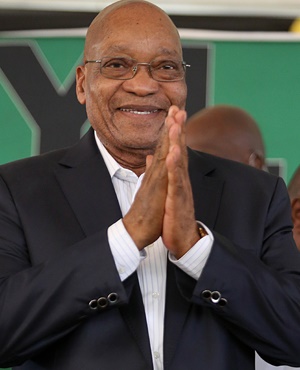
“We want him with his corruption!”
These were the words of ANC Youth League leader Julius Malema a few years ago when he was campaigning for the corruptible Jacob Zuma to be elected president our great Republic.
Indeed, today we have Zuma with his corruption. And he’s excellent at it. Not only did he bring with him the corruption that was the hallmark of his relationship with Schabir Shaik, his former financial advisor and fraudster. He also went on to pioneer a grand-scale corruption method called state capture.
The failure to prosecute him, despite incontrovertible evidence that he had accepted bribes from arms dealers through Shaik and acted on them, spurred him on to do more corruption.
If anyone wants evidence of what unpunished corruption does to a nation, look no further than Zuma. Unpunished corruption begets more corruption.
Malema, who subsequently changed his views on Zuma and was consequently expelled from the ANC, is fighting the corruption he once embraced. How fast our politics move!
Now leader of the Economic Freedom Fighters and probably much wiser after accumulating two university degrees since then, Malema has apologised for supporting Zuma.
In an explanation that is hard to believe, he has said that he had been lied to by people who claimed that President Thabo Mbeki had plans to amend the Constitution to serve a third term as president of the country.
It was no doubt a bad decision for Mbeki to contest a third term as ANC president as this would have raised a spectre of a former president ruling from the “grave” in Luthuli House.
But the suggestion that he would have amended the Constitution of the country to serve a third term can only be believed by people who have paid little or no attention to the workings of our constitutional system.
Some people might retort: “This is Africa. It could happen”. The truth is, the ranging battle for the soul of South Africa is about preventing the failures of postcolonial Africa caused by dictators, shaky rule of law and rampant corruption from taking root on the southern tip of the continent.
We must not give up on the dream of being an exceptional nation. Although pretentiously humble people among us frown upon the idea of exceptionalism, we should hold on to it. Where appropriate, we should export it through soft power in our conduct of international relations.
The African continent contributed to our exceptionalism in two ways. Firstly, it helped South Africa to get out of the apartheid abyss by supporting the liberation movements. Secondly, postcolonial Africa gave South Africa a case study of how not to run a government after independence.
We had the advantage of seeing the mistakes of former liberation movements turning into monsters against the people they represented in the fight against colonialism. Safeguards were introduced in our Constitution to prevent abuse of state power.
We should know better what to do when our own liberation movement that has been derailed by corruption threatens the security of the state and its sovereignty.
We also had our own recent experience with the National Party which taught us about the perils of a party that holds unmitigated hegemonic power across the tentacles of the state and society. Our Constitution contains a number of provisions to prevent the repeat of past racial divisions and abuse of state power.
The commitment by the majority of South Africans, black and white, to the new constitutional values of human rights, accountability and transparency in the conduct of state affairs serves as a countervailing force within the political system.
This system seems to be too complex for Zuma. I doubt he understands that the struggle for freedom in which he participated was about setting up this very system he is now up against. Had Zuma understood it, he wouldn’t have forged a corrupt relationship with Shaik and the Guptas.
While Zuma has promoted some of the things that dictators cherish – ethnic regionalism, looting and avoiding accountability to some extent – one thing he can’t do is to extend his term in office beyond ten years. He has found an indirect way to do it by backing his ex-wife Nkosazana Dlamini-Zuma.
But even this won’t help him. Nkosazana might well try to protect him if she is elected, but she’ll have to be prepared to contend with the countervailing forces that are the product of our Constitution. Those forces extend beyond ANC slates and narrow regional political alliances. They are rooted in the activism of citizens. Her presidency, IF (big IF) the ANC wins elections under her candidacy, would be wobbly.
The idea that Mbeki had the power to amend the Constitution to serve a third term simply because the ANC had a two-thirds majority at the time doesn’t make sense because we have an exceptional Constitution that curtails political extremisms of that type. An amendment of that nature would have gone against the principles adopted in the multiparty transitional negotiations.
These principles, which support regular elections, a presidential term limit and a Bill of Rights that contains a range of political rights are the foundations on which our Constitution is anchored. A radical amendment of that nature would have been rejected by the Constitutional Court at first glance.
One can’t help but reflect on the uncomfortable truth about Malema’s former embrace of Zuma and “his corruption” because next week Friday, the Supreme Court of Appeal (SCA) will hear an appeal by the National Prosecuting Authority (NPA) and Zuma, who are fighting hard to give him special treatment. They want the equality before the law provisions, one of the most profound principles of the Constitution to be tempered with so that Zuma can avoid facing corruption charges.
It is worth recalling that in the process of avoiding prosecution, Zuma – with the acquiesce of the ANC – destroyed an anti-corruption agency, the Scorpions, that investigated him for corruption and caused mayhem in the entire criminal justice system. There has never been stability in the NPA and the police since he took over. Public confidence in these institutions is at an all-time law.
Through the countervailing force of citizen activism, businessman Hugh Glenister took the matter to the Constitutional Court to fight against the disbandment of the elite crime-busting unit that conducted unique prosecution-led investigations. In their majority judgement, Deputy Chief Justice Dikgang Moseneke and Justice Edwin Cameron, ruled that the government was obliged to set an independent corruption-fighting unit structurally and politically shielded from political interference.
In their judgement, they warned about the dangers of corruption.
“There can be no gainsaying that corruption threatens to fell at the knees virtually everything we hold dear and precious in our hard-won constitutional order,” the judges said. “It blatantly undermines the democratic ethos, the institutions of democracy, the rule of law and the foundational values of our nascent constitutional project. “
They went on to explain how corruption fuels maladministration and public fraudulence and imperils the capacity of the state to fulfil its obligations to respect, protect, promote and fulfil all the rights enshrined in the Bill of Rights.
“When corruption and organised crime flourish, sustainable development and economic growth are stunted. And in turn, the stability and security of society is put at risk.”
The judges also quoted from the SCA’s judgement in State v Shaik and Others. That appeal was an attempt by Shaik to overturn an adverse judgement against him. It failed.
Of corruption, the SCA judges said: “It lowers the moral tone of a nation and negatively affects development and the promotion of human rights. As a country we have travelled a long and tortuous road to achieve democracy. Corruption threatens our constitutional order. We must make every effort to ensure that corruption with its putrefying effects is halted.”
We wait in great anticipation what the SCA judges will say after hearing the spy tape case next Friday in a matter that deals with the very same Shaik/Zuma corruption that was before them in State v Shaik and Others.
- Mpumelelo Mkhabela is a fellow at the Centre for the Study of Governance Innovation (GovInn) at the University of Pretoria.
Disclaimer: News24 encourages freedom of speech and the expression of diverse views. The views of columnists published on News24 are therefore their own and do not necessarily represent the views of News24.
* Only comments that contribute to a constructive debate will be approved by moderators.




 Publications
Publications
 Partners
Partners






















